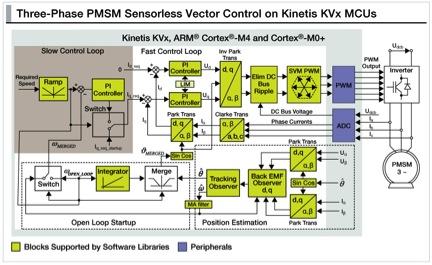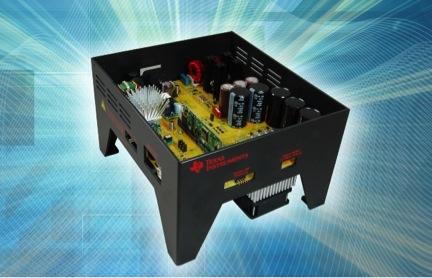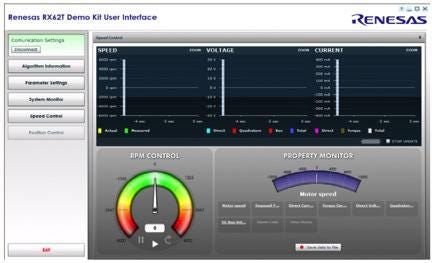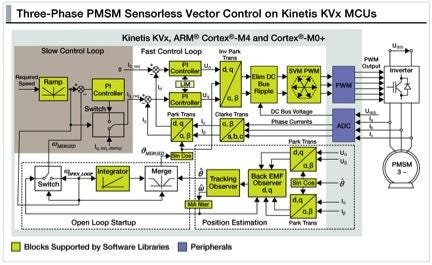Learning From a Hands-On Motor Control Project
April 9, 2015

I recently finished up my Design News Continuing Education Center online class on motor control, and, as usual, I learned plenty, just as I hope the course attendees did. One thing different about this class was the addition of an optional hands-on project that attendees could choose to do after completing the course. With new (or refreshed) knowledge about motor control principles, techniques, devices, reference designs, and software tools it seemed to make sense to suggest that interested students take the next step and try a hands-on project to further solidify the course content.
I suggested that students review the various reference designs and software resources discussed in the course and select one that made the most sense for their next project or to learn more about a class of motor control algorithm of the most interest. I provided several examples of reference designs that could be possibilities, but there are so many available it was impractical to list them all. I'm going to list a few of them below, with some short descriptions so anyone who wants take the archived version of the course and participate in the hands-on project can follow along. We can use my blog, and the comments section below, to provide updates on the reference designs selected, progress on trying out the design, and asking/answering any questions that come up during the process.
Motor Control Reference Designs -- Some Examples
One of the main variables for motor control designs is the amount of power the motor can supply. Texas Instruments' High Voltage Motor Control Kit, for example, can support up to 750W for either AC or DC power sources. The reference design hardware is shown in the figure below, and you can tell it is really designed for heavy metal motor control applications. It supports AC Induction (ACI), brushless DC (BLDC), and permanent magnet synchronous motor (PMSM) using the Piccolo TMS320F28027F or TMS320F28069M MCUs. The provided TI InstaSPIN-FOC and InstaSPIN-MOTON software technologies and the TI MotorWare software tool kit complete the development, making it easy to get started.

The Renesas RX62T Motor Control Reference Design works for BLDC and PMSM motors using either a single shunt or triple shunt sensor-less vector control algorithm. In addition to all the application hardware (even a motor) and software the kit also provides a GUI for setting motor parameters and evaluating performance (see the screen shot below). This makes it easy to try different algorithms and evaluate their effect on the target motor.

Another reference design, from Freescale Semiconductor, supports one of the more complex algorithms that uses a three-phase sensor-less vector control algorithm, illustrated in the figure below. This Reference Design uses mathematically complex algorithms for sensing rotor position and multiple control loops for efficiently controlling motor speed and current. The most complex algorithms provide transformation functions that change the frame of reference from the dynamic magnetic field that revolves around the rotor to a static frame of reference located on the rotor. The Kinetis KV MCUs provide all the processing horsepower needed to execute all the computations with even ample processing power to implement user interfaces, communications, and safety features needed in modern motor designs. The provided software even includes advanced tuning support to simplify selecting the various motor parameters needed for the control loops and transformation functions.

Next Steps
This is just a small selection from the vast number of motor control reference designs available. Are there other motor control reference designs you think we should add to the list of possible starting points for a hands-on project? Do you think we should select a particular type of motor to focus on? Let me know what you think and please leave a comment below. We can all look over the suggestions to see which ones might make the best hands-on project starting point. If you have already selected a reference design, let us know what it is, and why you selected it. In future blogs I will consolidate what we have learned so we can all share in each other successes as well as dead ends.
Warren Miller has more than 30 years of experience in electronics and has held a variety of positions in engineering, applications, strategic marketing, and product planning with large electronics companies like Advanced Micro Devices, Actel, and Avnet, as well as with a variety of smaller startups. He has in-depth experience of programmable devices (PLDs, FPGAs, MCUs, and ASICs) in industrial, networking, and consumer applications and holds several device patents.
Design engineers, New England's premier design and manufacturing event, Design & Manufacturing New England, will take place in Boston, May 6-7, 2015. A Design News event, Design & Manufacturing New England is your chance to meet qualified suppliers, get hands-on with the latest technologies, be informed, and expand your network. Learn more here.
About the Author(s)
You May Also Like



